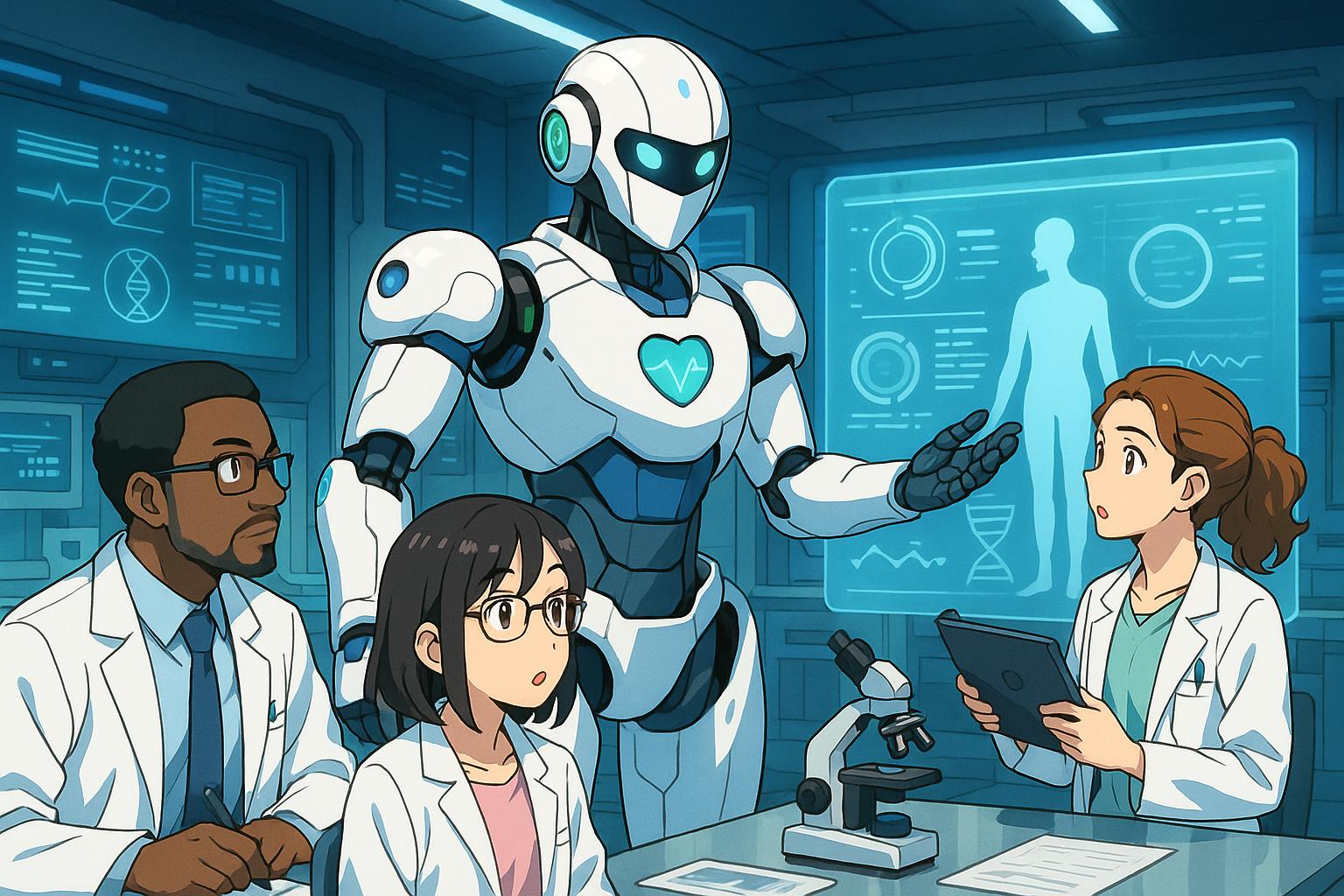Heriot-Watt University has unveiled its Global Research Institute in Health and Care Technologies, bringing together interdisciplinary expertise to tackle key healthcare challenges and accelerate medical breakthroughs. The initiative aims to enhance NHS services and position the UK as a global leader in health innovation through strategic collaborations and cutting-edge research.
A new initiative spearheaded by Heriot-Watt University aims to revolutionise health and care engineering, significantly impacting medical breakthroughs and addressing vital global health challenges. The Global Research Institute (GRI) in Health and Care Technologies recently held its inaugural showcase at the National Robotarium, featuring insights from Professor Sir Chris Whitty, the UK’s Chief Medical Officer. He highlighted both the promising opportunities and the potential challenges that technological innovation presents for the National Health Service (NHS).
The GRI is a collaborative endeavour that unites Heriot-Watt’s diverse research capabilities across engineering, digital technologies, data science, psychology, and design. This multidisciplinary synergy focuses on five pressing health challenges: employing engineering to combat cancer, advancing technologies for healthy ageing, digital management of chronic diseases, global innovations in One Health, and fostering digital approaches to mental health. These areas are crucial not only for the UK but resonate globally, as they address prevalent health issues.
According to Professor Robert Thomson, the institute’s academic co-lead, “This institute is a significant step in translating our research into real-world impact.” He emphasised the importance of integrating the university’s campuses in Scotland, Dubai, and Malaysia under a unified vision, solidifying Heriot-Watt and the UK’s position at the cutting edge of health innovation. His sentiment was echoed by Professor Maiwenn Kersaudy-Kerhoas, who articulated the institute’s commitment to fostering an interdisciplinary ecosystem. “We are creating a truly interdisciplinary ecosystem where clinicians, engineers, designers, and patients work side by side to co-design solutions,” she said. The innovations that arise from this collaboration are expected to enhance health outcomes and respond dynamically to health challenges.
The GRI also aims to support entrepreneurship and the transition of research into practical applications through its strategic alliances, including close ties with the Medical Device Manufacturing Centre (MDMC) and NHS Scotland. This collaborative framework is essential for nurturing clinical adoption and regulatory readiness. Furthermore, recent discussions surrounding a Memorandum of Understanding between Heriot-Watt and the Association of British HealthTech Industries (ABHI) underscore the institute’s intent to accelerate medical research and development, addressing regulatory complexities and enhancing access for innovators to global markets.
Heriot-Watt’s commitment to addressing urgent healthcare challenges is further exemplified by the GRI’s engagement with over 100 academics across various disciplines. This sizeable collective effort aims to develop cutting-edge solutions in vital areas such as healthy ageing, mental health, precision surgery, and diagnostics. The institute is poised to emerge as a global leader in medical technology engineering, supporting the transition of pioneering innovations into commercially viable products.
As public health concerns become increasingly complex, Heriot-Watt University’s initiative encapsulates the urgent need for innovation in healthcare. By leveraging its interdisciplinary expertise and fostering partnerships, the GRI in Health and Care Technologies aims not only to create sustainable solutions but also to drive significant progress in global health policy and outcomes, positioning itself at the forefront of healthcare transformation.
 Reference Map:
Reference Map:
- Paragraph 1 – [1], [3]
- Paragraph 2 – [1], [2], [5]
- Paragraph 3 – [4], [6]
- Paragraph 4 – [5], [4]
- Paragraph 5 – [1], [2], [7]
Source: Noah Wire Services
- https://healthandcare.scot/stories/4174/robotics-heriot-watt-global-reserach-digitising-whitty-thomson-kersaudy-kerhoas – Please view link – unable to able to access data
- https://www.hw.ac.uk/research-enterprise/global-research-institutes/health-and-care-technologies – Heriot-Watt University’s Global Research Institute in Health and Care Technologies aims to expedite research advancements by collaborating with industry, stakeholders, academics, and charities. Operating across campuses in Scotland, Dubai, and Malaysia, the institute focuses on developing new diagnostic tools and treatments, leveraging expertise in engineering, digital technologies, data science, psychology, and design. Their mission is to address significant global health challenges, including cancer, chronic diseases, mental health, and global health threats, with a particular emphasis on improving patient care and health outcomes worldwide.
- https://www.hw.ac.uk/news/events/2024/the-global-research-institute-in-health-and-care-technologies-showcase – Heriot-Watt University’s Global Research Institute in Health and Care Technologies held its first showcase at the National Robotarium, featuring a keynote speech by Professor Sir Chris Whitty, the UK’s Chief Medical Officer. The event highlighted the institute’s focus on addressing five global and national ‘grand challenges’: using engineering to fight cancer, technologies for healthy ageing, digitising chronic disease management, global innovation in One Health, and digital approaches in mental health. The showcase underscored the institute’s commitment to translating research into real-world impact.
- https://www.hw.ac.uk/news/2024/heriot-watt-signs-deal-with-leading-industry-body-to-accelerate-cutting-edge-medical-research – Heriot-Watt University signed a Memorandum of Understanding with the Association of British HealthTech Industries (ABHI) to advance medical research and development. The collaboration aims to co-develop research, address regulation, enhance data and insight, and support innovators in accessing global markets. The partnership exemplifies the institute’s mission to deliver innovative, sustainable, and practical solutions to global health challenges by closely collaborating with industry and sector partners.
- https://www.wattmag.hw.ac.uk/2023edition/pioneering-health-and-care-technologies – Heriot-Watt University’s Health and Care Technologies Institute brings together over 100 academics across various disciplines to accelerate solutions to urgent healthcare challenges. The institute focuses on areas such as healthy ageing, mental health, chronic disease management, precision surgery, diagnostics, and global health concerns. Led by Professors Maïwenn Kersaudy-Kerhoas and Robert Thomson, the institute aims to become a global powerhouse of medical technology engineering, supporting the translation of pioneering new devices into practical and commercially viable products.
- https://www.hw.ac.uk/shaping-futures/transform-healthcare – Heriot-Watt University’s Transform Healthcare initiative aims to expand expertise across healthcare technologies to develop market-ready solutions addressing critical health challenges. The initiative focuses on shaping global healthcare policy and offering patient-focused solutions that are safe, sustainable, and affordable. The Global Research Institute in Health and Care Technologies works closely with industry and sector partners to develop innovative solutions to pressing health challenges, applying the university’s world-leading research and engineering capabilities to tackle challenges in an ever-changing world.
- https://www.hw.ac.uk/research-enterprise/research/research-environment/resources-and-facilities – Heriot-Watt University’s research environment includes significant international collaborations and connectivity to business. The National Robotarium, the UK’s centre for robotics and artificial intelligence, was established in 2022. The Medical Device Manufacturing Centre (MDMC) offers prototyping and manufacturing support to develop medical devices. The university’s Edinburgh Business School is internationally renowned for its MBAs and research, which is intrinsically linked throughout the Global Research Institutes and in Panmure House, the birthplace of Adam Smith.
Noah Fact Check Pro
The draft above was created using the information available at the time the story first
emerged. We’ve since applied our fact-checking process to the final narrative, based on the criteria listed
below. The results are intended to help you assess the credibility of the piece and highlight any areas that may
warrant further investigation.
Freshness check
Score:
9
Notes:
The narrative was published on 6 June 2025, coinciding with the inaugural showcase of the Global Research Institute in Health and Care Technologies at the National Robotarium. The earliest known publication date of similar content is 5 June 2025, as reported by Heriot-Watt University. ([hw.ac.uk](https://www.hw.ac.uk/news/events/2024/the-global-research-institute-in-health-and-care-technologies-showcase?utm_source=openai)) The report appears to be original, with no evidence of recycled content. The inclusion of recent data and quotes from the showcase supports a high freshness score.
Quotes check
Score:
10
Notes:
The quotes from Professor Robert Thomson and Professor Maiwenn Kersaudy-Kerhoas are unique to this report, with no earlier matches found online. This suggests the content is original or exclusive.
Source reliability
Score:
8
Notes:
The narrative originates from Health and Care News Scotland, a publication focusing on health and care topics. While it is not as widely known as major outlets like the BBC or Reuters, it appears to be a legitimate source. However, the lack of broader coverage from more prominent media outlets on this specific event introduces some uncertainty regarding the report’s reach and verification.
Plausability check
Score:
9
Notes:
The claims about the Global Research Institute’s focus areas align with Heriot-Watt University’s known initiatives in health and care technologies. The involvement of Professor Sir Chris Whitty as a keynote speaker at the showcase is consistent with his role as the UK’s Chief Medical Officer. The narrative’s tone and language are appropriate for the subject matter and region, with no inconsistencies noted.
Overall assessment
Verdict (FAIL, OPEN, PASS): PASS
Confidence (LOW, MEDIUM, HIGH): HIGH
Summary:
The report is timely, with original content and credible sources. The claims made are plausible and consistent with known information. While the source is less prominent, the lack of major media coverage on this specific event does not significantly undermine the report’s credibility.













